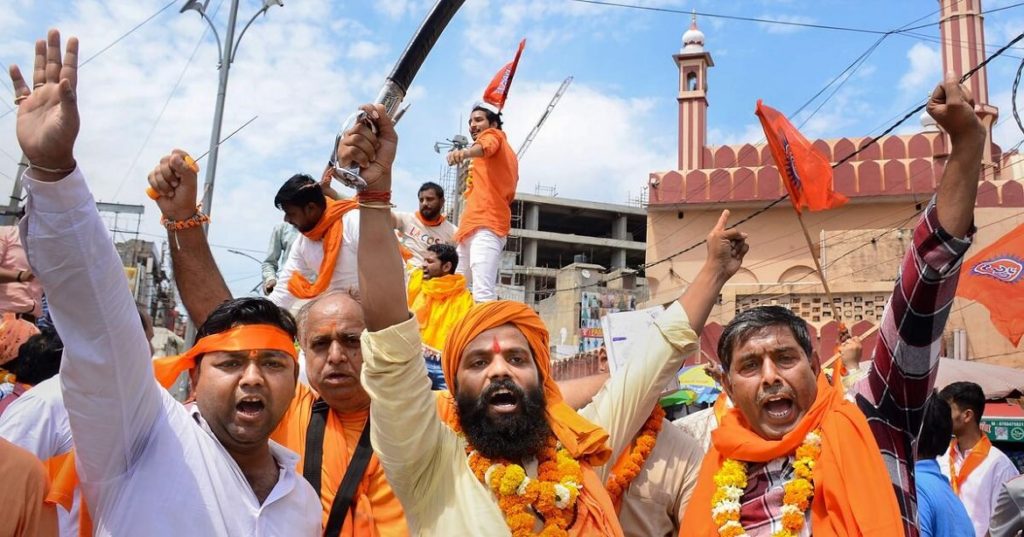By Sahar Amjad
Hatred, accompanied by feelings of prejudice and aversion, shapes the psychological inclination of a society or community. It transforms individuals and drives communities to develop a mindset of ever-increasing negativity and resentment, ready to burst into flames of anger and hostility, adding fuel to the fire.

A wave of similar manifestations is occurring in contemporary India. The assertive manifestation of hypernationalism is segregating Indian society, resulting in a division between a dominant majority and a subordinate minority. India is inhabited predominantly by Hindus, along with Muslims, Sikhs, and Christians, who are considered minorities in the country. Since the advent in 2014 of the Hindu nationalist Bharatiya Janata Party (BJP), as the main governing political force, a new phenomenon, called the radicalization of the Hindu masses, has emerged and grown.
Following the dictates of the strict Hindutva nationalism propagated by extremist nationalist leaders, this phenomenon perceives minorities as a threat. They believe that Hindus are the true Indians and have by birthright not only the right to own the land, but also the absolute ownership of every privilege. This has created a pandemonium characterized by the politics of exclusion and sectarianism.
The state of this growing chaos is evidenced nationally and internationally by recent recurrent attacks on Indian minorities, such as the mob lynching of a person with learning disabilities, Muhammad Issar, who was beaten to death for simply taking a banana from a Hindu temple; or the attack on a mosque in Maharashtra’s Satara district, where a mob of some 150-200 Hindu men, chanting anti-Muslim slogans, brutally lynched to death Nurul Hassan, a young engineer.
All these incidents, carried out under the banner of an anti-Muslim and anti-minority agenda, have become a daily reality in India, along with archaic discrimination against minorities in terms of education, employment, and health facilities. Upset by this continuing emotional and physical violence, minorities in India are also experiencing a complete disregard for the danger posed by this emerging non-acceptance of them.
The same series of deprivations, though of lesser intensity, is again taking root within the Indian Sikh community. Canadian Prime Minister Justin Trudeau’s recent announcement that there are credible allegations that the assassination in Canada of Hardeep Singh Nijjar, a supporter of the Sikh separatist cause, was carried out with the involvement of the Indian government caused a stir. The call for a separate state for Sikhs dates back to the 1980s, evoking poignant memories of the past. A large faction of the Sikh community felt the need to protect their cultural and religious identity, and for greater autonomy in the social, economic and political spheres respectively. Despite promises, their demands were met with utter neglect, leading to a rupture between the central Indian administration and Punjab. resulting in multiple targeted operations against legions of pro-separatists, leading to their demise and the ultimate demolition of the entire cause.
This depiction of repression is not only limited to violent acts of intimidation, but is also enshrined in a series of draconian laws. Such as the Citizenship Amendment Act of 2019, which accelerated the granting of faith-based citizenship by deliberately removing the mention of Muslims within the law. Another such law, enforced in some Indian states such as Uttar Pradesh, concerns “cow protection,” allowing so-called cow vigilantes to take justice into their own hands by deliberately attacking citizens without the availability of any prior evidence.
Similarly, there have been continuous attacks and illegal detentions of human rights activists throughout the region. Any protest related to discriminatory laws, for example the government’s new farm laws of November 2020, is immediately linked to the Sikh separatist agenda. India’s hyper-nationalist leaders blame the Sikh community, holding it responsible even for simply organizing a peaceful protest.
Therefore, there is an urgent need to change laws and protect minority rights in terms of reviving and maintaining the concept of non-discrimination regardless of religion, gender and any applicable human parameter.
India’s importance has increased significantly over the past decade as it has become an emerging global power, particularly in South Asia, where it serves also as a geopolitical counterweight to China. India has made reliable progress in key areas such as information technology, services, agriculture and manufacturing. But on another hand, it has adopted a completely opposite approach, imposing and spreading a culture imbued with indescribable subjugation and hostility. The hyper-nationalist tendencies are now so entrenched, and their consequent actions, implicit and explicit, have become a persistent threat, not only domestically, endangering the lives of minorities, but also internationally, tarnishing the state’s image and putting its very identity at stake, as evidenced by the deterioration of relations with Canada, India’s longtime trading partner, and now no longer so.
The weakening and subjugation of minorities will only bring intolerance and hate. Therefore, it is now more important than ever for India to heed these growing concerns and prevent unjust trials through the implementation of a responsible criminal justice system. To replace hyper-nationalism with more responsible nationalism. As in the words of Martin Luther King, “Darkness cannot drive out darkness; only light can do that. Hate cannot drive out hate; only love can do that.”
Author: Sahar Amjad – Researcher of peace studies and conflict resolution. She has acquired her Bachelor’s degree in International Relations from Buitems, Quetta.
(The views expressed in this article belong only to the authors and do not necessarily reflect the views of World Geostrategic Insights)
Image Credit: PTI







